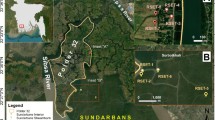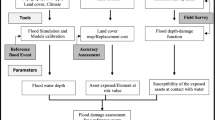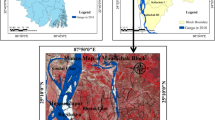Abstract
The northern shore of Lake Ontario is one of the longest settled parts of Canada beginning around 1795. Accelerated settlement and deforestation after 1840 resulted in massive soil loss from easily-eroded Pleistocene glacial landscapes and the siltation of creeks and lagoons. Channel capacity was reduced but river flow was enhanced by diminished infiltration resulting in straightening of meandering channels, accelerated erosion of stream banks, increased incidence of downstream flooding and large influxes of mud to Lake Ontario. Conservation measures after World War II were successful but rapid urban sprawl after 1970 hardened watersheds and badly impacted the quality and quantity of surface and ground waters flowing to Lake Ontario. The Frenchman’s Bay watershed (27 km2) 50 km east of Toronto is one of the country’s most urbanized (pop: 100,000; 76 % urban cover) and is crossed by Canada’s busiest highway (Highway 401). The watershed drains to Lake Ontario through a coastal lagoon (Frenchman’s Bay) in which pre-settlement postglacial carbonate is abruptly overlain by a ‘European settlement’ mud layer rich in weed pollen and organic debris; the uppermost ‘urban’ part of this deposit shows elevated level of metals and other contaminants. This layer records soil loss after 1840 and more recently, the influx of contaminated urban waters and sediment. Some 7,600 tonnes of road salt have been applied to the lagoon watershed each year producing spikes of brackish surface runoff during winter thaws. Some 50 % of the total salt applied to the entire watershed is conveyed directly to Frenchman’s Bay Lagoon via surface runoff; the rest enters the groundwater system resulting in year-round brackish baseflow to creeks. Chloride continues to be stored in underlying aquifers such that the system has yet to reach a steady-state discharge. Future salinity of baseflow reaching the lagoon can be expected to increase by about 40 %. Rapid migration of contaminated groundwater is facilitated by the widespread presence of thick (<8 m) coarse-grained and heterogeneous fill materials of the built landscape. The watershed is experiencing ongoing changes in land use as urban infilling proceeds. The aquatic ecology of inflowing creeks to the lagoon has been greatly impacted resulting in major loss of wetlands and submergent vegetation and distinct changes in the structure of fish populations. This is the most detailed study of an urban watershed in Canada; lack of knowledge elsewhere is a constraint on the design and testing of mitigation measures and is a major impediment to assessing the impact of ongoing climate change on urban water resources, and the effects of urban runoff on Great Lakes water quality.










Similar content being viewed by others
References
Baltrenas P, Kazlauskiene A (2007) Grass vegetation dynamics in soil contaminated with salt. Ekologia 53:58–63
Baltrenas P, Kazlauskiene A (2009) Sustainable ecological development reducing negative effects of road maintenance salts. Tech Econ Dev Econ: Baltic J Sust 15:178–188
Barlage MJ, Richards PL, Sousonis PJ, Brenner AJ (2002) Impacts of climate change and land use change on runoff from a Great Lakes Watershed. J Great Lakes Res 28:568–582
Bradford A, Gharabaghi B (2004) Evolution of Ontario’s stormwater management planning and design guidance. Water Qual Res J Can 39:343–355
Brazner JC, Beals EW (1997) Patterns in fish assemblage from coastal wetland and beach habitats in Green Bay, Lake Michigan: a multivariate analysis of abiotic and biotic forcing factors. Can J Fish Aquat Sci 54:1743–1761
Brezonik P (2002) Analysis and predictive models of storm water runoff volumes, loads, and pollution concentration from watersheds in the Twins Cities metropolitan area, Minnesota, USA. Water Res 36:1742–1757
Buffleben MS, Zayeed K, Kimbrough D, Stenstrom M, Suffet IH (2002) Evaluation of urban non-point source runoff of hazardous metals entering Santa Monica Bay, California. Water Sci Technol 45:263–268
Casselman JM, Lewis CA (1996) Habitat requirements of northern pike (Esoxlucius). Can J Fish Aquat Sci 53:161–174
Chang H, Carlson T (2005) Water quality during winter storm events in Spring Creek, Pennsylvania, USA. Hydrobiology 544:321–332
Charlesworth S, Everett M, McCarthy R, Ordonez A, de Miguel E (2003) A comparative study of heavy metal concentration and distribution in deposited street dust in a large and a small urban area: Birmingham and Coventry, West Midlands, UK. Env Int 29:563–573
Chilton J (ed) (1997) Groundwater in the urban environment, v.1: problems processes and management. Balkema, Rotterdam, Netherlands
Chow-Fraser P (1999) Seasonal, inter annual and spatial variability in the concentrations of total suspended solids in a degraded coastal wetland of Lake Ontario. J Great Lakes Res 25:799–813
Chow-Fraser P, Crosbie B, Bryant D, McCarry B (1996) Potential contribution of nutrients and polycyclic aromatic hydrocarbons from the creeks of Cootes Paradise Marsh. Water Qual Res J Can 31:485–503
Chow-Fraser P, Lougheed VL, Crosbie B, LeThiec V, Simser L, Lord J (1998) Long term response of the biotic community to fluctuating water levels and changes in water quality in Cootes Paradise Marsh, a degraded coastal wetland of L. Ontario. Wetland Ecol Manag 6:19–42
Clinton BD, Vose JM (2006) Variation in stream water quality in an urban headwater stream in the southern Appalachians. Water Air Soil Poll 169:331–353
Diersch HG (2002) FEFLOW reference manual. WASI Institute for Water Resources Planning and Systems Research Ltd, Berlin, p 278
Ding G, Jiao JJ, Zhang D (2008) Modelling study on the impact of deep building foundations on the groundwater system. Hydrol Process 22:1857–1865
Ehrenfeld JG (2000) Evaluating wetlands within an urban context. Urban Ecos 4:69–85
Eyles N (1997) Environmental geology of a supercity: the Greater Toronto Area. In: Eyles N (ed) Environmental geology of urban areas. Geological Association of Canada, St. John’s, Newfoundland. Geotext 3, pp 7–80
Eyles N, Chow-Fraser P (2003) Remediation of an urban-impacted watershed and lagoon—Frenchman’s Bay, City of Pickering: final report to Ontario Innovation Trust and City of Pickering
Eyles N, Meriano M (2010) Road impacted sediment and water in a Lake Ontario watershed and lagoon, City of Pickering, Ontario, Canada: an example of urban basin analysis. Sed Geol 224:15–28
Eyles N, Doughty M, Boyce JI, Meriano M, Chow-Fraser P (2003) Geophysical and sedimentological assessment of urban impacts in a Lake Ontario watershed and lagoon: Frenchman’s Bay, Pickering, Ontario. Geosci Can 30:115–128
Finkelstein SA, Davis AM (2006) Paleoenvironmental records of water level and climatic changes from the middle to late Holocene at a Lake Erie coastal wetland, Ontario, Canada. Quat Res 65:33–43
Finkelstein S, Peros MC, Davis AM (2005) Late Holocene paleoenvironmental change in a Great Lakes coastal wetland integrating pollen and diatom datasets. J Paleolimol 33:1–12
Forman RT, Deblinger RD (2000) The ecological road-effect zone of a Massachusetts (USA) suburban highway. ConsBio 14:36–46
Freeman MC, Bowen ZH, Bovee KD, Irwin ER (2001) Flow and habitat effects on juvenile fish abundance in natural and altered flow regimes. Ecol Apps 11:179–190
Gerber RE, Howard K (2000) Recharge through a regional till aquitard: three-dimensional flow model water balance approach. Ground Water 38:410–422
Gerber RE, Boyce JI, Howard KWF (2001) Evaluation of heterogeneity and field-scale groundwater flow in a leaky till aquitard. Hydrogeol J 9:60–78
Granato GE, Church PE, Stone VJ (1995) Mobilization of major and trace constituents of highway runoff in groundwater potentially caused by deicing chemical migration. Transp Res Rec 1483:92–104
Gray L (2004) Changes in water quality and macroinvertebrate communities resulting from urban storm flows in the Provo River, Utah, USA. Hydrobiology 518:33–46
Helms BS, Feminella JW, Pan S (2005) Detection of biotic responses to urbanization using fish assemblages from small streams of western Georgia, USA. Urban Ecosyst 8:39–57
Howard K, Haynes J (1997) Contamination of urban groundwater by road de icing chemicals. In: Eyles N (ed) Environmental geology of urban areas. Geological Association of Canada, St. John’s, Newfoundland. Geotext 3, pp 146–152
International Joint Commission, Great Lakes Water Quality Board (2003) Climate change and water quality in the Great Lakes basin, IJC, Windsor
Jude DJ, Pappas J (1992) Fish utilization of Great Lakes coastal wetlands. J Great Lakes Res 18:651–672
Koryak M, Stafford LJ, Reilly RJ, Magnuson PM (2001) Highway deicing salt runoff events and major ion concentrations along a small urban stream. J Fresh Ecol 16:125–134
Labadia CF, Buttle JM (1996) Road salt accumulation in highway snow banks and transport through the unsaturated zone of the Oak Ridges Moraine, Southern Ontario. Hydrol Process 10:1575–1589
Lewis CFM, Mayer LA, Mukhopadhyay PK, Kruge MA, Coakley JP, Smith MD (2000) Multibeam sonar backscatter lineaments and anthropogenic organic components in lacustrine silty clay, evidence of shipping in western Lake Ontario. Int J Coal Geol 43:307–324
Lougheed VL, Chow-Fraser P (2001) Spatial variability in the response of lower trophic levels after carp exclusion from a freshwater marsh. J Aquat Ecosyst Stress Recov 9:21–34
Marsalek J, Oberts G, Exall K, Viklander M (2003) Review of operation of urban drainage systems in cold weather: water quality considerations. Water Sci Tech 48:11–20
McCarthy F, McAndrews J (1988) Water levels in Lake Ontario 4230–2000 years BP: Grenadier Pond, Toronto, Canada. J Paleolimnol 1:99–113
McFadden MA, Mullins HT, Patterson WP, Anderson WT (2004) Paleoproductivity of eastern Lake Ontario over the past 10,000 years. Limnol Ocean 49:1570–1581
McNair SA, Chow-Fraser P (2003) Change in biomass of benthic and planktonic algae along a disturbance gradient for 24 Great Lakes coastal wetlands. Can J Fish Aquat Sci 6:676–689
McNeely RN, Neimanis VP, Dwyer L (1979) Water quality sourcebook. A guide to water quality parameters. Inland Waters Directorate, Water Quality Branch, Ottawa, Canada
Meriano M (2007) Groundwater–surface water interaction in Frenchman’s Bay watershed, Ontario: implications for urban recharge, contaminant storage and migration. Dissertation University of Toronto, Canada
Meriano M, Eyles N (2003) Groundwater flow through Pleistocene glacial deposits in the rapidly urbanizing Rouge River-Highland Creek watershed, City of Scarborough, Southern Ontario. Hydrogeol J 11:288–303
Meriano M, Eyles N (2009) Quantitative assessment of the hydraulic role of subglaciofluvial interbeds in promoting deposition of deformation till (Northern Till, Ontario). Quat Sci Rev 28:608–620
Meriano M, Eyles N, Howard KWF (2009) Hydrogeological impacts of road salt from Canada’s busiest highway on a Lake Ontario watershed and lagoon (Frenchman’s Bay), City of Pickering. J Con Hydrol 107:66–81
Mikkelsen PS, Hafliger M, Ochs M, Jacobsen P, Tjell JC, Boller M (1997) Pollution of soil and groundwater from infiltration of highly contaminated storm water—a case study. Water Sci Technol 8–9:325–350
Moodie S (1852) Roughing it in the bush. Richard Bentley, London
Novotny EV, Stefan HG (2009) Projections of chloride concentrations in urban lakes receiving road de-icing salt. Wat Air Soil Pollut 211:261–271
Novotny EV, Murphy D, Stefan HG (2008) Increase of urban lake salinity by road deicing salt. Sc Tot Env 406:131–144
Perry C, Taylor K (eds) (2007) Environmental sedimentology. Blackwell, Malden
Polkowska Z, Zabiegala B, Gorecki T, Namiesnik J (2005) Contamination of runoff waters from roads with high traffic intensity in the urban region of Gdansk, Poland. Pol J Env Stud 14:799–807
Pozza MR, Boyce JI, Morris WA (2004) Lake-based magnetic mapping of contaminated sediment distribution, Hamilton Harbour, Ontario, Canada. J Appl Geophys 57:23–41
Reinhardt EG, Little M, Donato S, Findlay D, Krueger A, Clark C, Boyce JI (2005) Arcellacean (thecamoebian) evidence of land-use change and eutrophication in Frenchman’s Bay, Pickering, Ontario. Env Geol 47:729–739
Richardson AH (1944) The Ganaraska watershed. Bowen, Toronto, p 248
Richardson AH (1974) Conservation by the people: the history of the conservation movement in Ontario to 1970. University of Toronto Press
Scott WB, Crossman EJ (1998) Freshwater fishes of Canada, 2nd edn, Fish. Res. Board Can. Bulletin 184, Ottawa, Canada
Seilheimer TS, Chow-Fraser P (2006) Development and use of the Wetland Fish Index to assess the quality of coastal wetlands in the Laurentian Great Lakes. Can J Fish Aquat Sci 63:354–366
Seilheimer TS, Wei A, Chow-Fraser P, Eyles N (2007) Impact of urbanization on the water quality and fish community of a Lake Ontario marsh, Frenchman’s Bay. Urban Ecol 10:299–319
SENES Consultants Ltd (1998) Environmental review: Pickering Nuclear Generating Station. Biophysical review and environmental action plan, vol 2
Shanley JB (1994) Effects of ion exchange on stream solute fluxes in a basin receiving highway deicing salts. J Env Qual 23:977–986
Stephenson T (1990) Fish reproductive utilization of coastal marshes of Lake Ontario near Toronto. J Great Lake Res 16:71–81
Taniguchi M (2005) Effects of urbanization and groundwater flow on subsurface temperature in three megacities in Japan. J Geophys Eng 2:320–325
Wang L, Lyons J, Kanehl P, Bannerman R, Emmons E (2000) Watershed urbanization and changes in fish communities in southeastern Wisconsin streams. J Am Water Res Ass 36:1173–1189
Warren LA, Zimmerman AP (1994) The influence of temperature and NaCl on cadmium, copper and zinc partitioning among suspended particulate and dissolved phases in urban rivers. Water Res 28:1921–1931
Weaver LA, Garman GC (1994) Urbanization of a watershed and historical changes in a stream fish assemblage. Trans Am Fish Soc 123:162–172
Wei A, Chow-Fraser P (2005) Untangling the confounding effects of urbanization and high water level on the cover of emergent vegetation in Cootes Paradise Marsh, a degraded coastal wetland of Lake Ontario. Hydrobiol 544:1–9
Wei A, Chow-Fraser P (2006) Synergistic impact of water level fluctuation and invasion of Glyceria on Typha in a freshwater marsh of Lake Ontario. Aquat Bot 84:63–69
Wells MG, Sealock L (2009) Summer water circulation in Frenchman’s Bay, a shallow coastal embayment connected to Lake Ontario. J Great Lakes Res 35:548–559
Weninger JM, McAndrews J (1989) Late Holocene aggradation in the lower Humber River, Toronto, Ontario. Can J Earth Sci 26:1842–1849
Zhu W, Bian B, Li L (2008) Heavy metal contamination of road-deposited sediments in a medium-sized city of China. Env Monit Assess 147:171–181
Acknowledgments
The City of Pickering, Toronto, and Region Conservation Authority, and the Toronto Harbour Commission are thanked for discussions and data, and the Natural Sciences and Engineering Research Council of Canada and Ontario Innovation Fund for funding. The project greatly benefitted from discussions with David Steele.
Author information
Authors and Affiliations
Corresponding author
Rights and permissions
About this article
Cite this article
Eyles, N., Meriano, M. & Chow-Fraser, P. Impacts of European settlement (1840–present) in a Great Lake watershed and lagoon: Frenchman’s Bay, Lake Ontario, Canada. Environ Earth Sci 68, 2211–2228 (2013). https://doi.org/10.1007/s12665-012-1904-8
Received:
Accepted:
Published:
Issue Date:
DOI: https://doi.org/10.1007/s12665-012-1904-8




